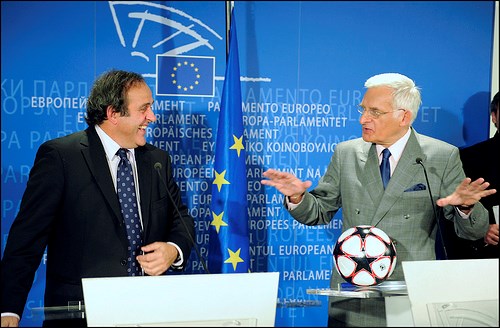UEFA tightens club requirements

UEFA President Michel Platini (pictured left) believes the Financial Fair Play Regulations are key to the future of football. Photo (c) flickr user European Parliament and used under a Creative Commons 2.0 licence.
European football clubs’ financial irresponsibility in the battle to obtain sporting success will be limited in the future. While a new UEFA report documents serious losses in European football, the European football federation UEFA, has now implored its new requirements for financial soundness.
UEFA already adopted the concept in its main features last year under the heading 'financial fair play', but the requirements will not take effect before the season 2011-2012. The basic principle is that clubs must have balanced accounts, and clubs which fail to meet the requirements risk exclusion from the lucrative European competitions.
At a press conference at UEFA’s headquarters on Tuesday January 11, President Michel Platini said the requirements are to be seen as a help to the clubs and their supporters despite the inherent penalties:
"Financial fair play is not aimed at putting clubs in difficulty. On the contrary, it aims to help them exit an infernal spiral which prevents certain of them from having a viable medium-term or long-term model."
A losing concern
At the press conference, UEFA also announced its annual economic analysis of the economy in European club football's top division; "The European Club Footballing Landscape - Club Licensing Benchmarking Report Financial Year 2009 '.
The figures show a football branch with scarlet red numbers on the bottom line. More than half of the clubs in Europe's top divisions (56 per cent) ended 2009 with a deficit, even though sales reached a record high of 11.7 billion Euros.
In total, football clubs' net loss was doubled to 1.2 billion Euros due to increased spending on single player salaries. From 2008 to 2009, the European clubs' wage expenses rose 61 percent amounting to 64 per cent of the total.
Such figures underline the need for more regulation, UEFA says.
"Supporters and lovers of football have no interest in seeing clubs that are part of European football's heritage disappear as a result of hazardous management. It was necessary for an authority to intervene, and this is what we are doing”, Michel Platini said at the press conference.
Aimed at Europe's largest
As a general rule, the regulations mean that UEFA now only allows a total deficit of up to 5 million Euros within three years.
However, a transitional arrangement exists allowing a deficit of up to 45 million Euros over three years if losses are matched by similar capital injections from the owners. This possibility will be gradually eliminated, so the requirement for balanced accounts is the main principle in the longer term.
The new financial regulation operates with amounts so big that it will mostly affect clubs with large budgets.
English football clubs stand out in this respect with an average club income of around 120 million Euros followed by Germany with an average income of around 86 million Euros.





